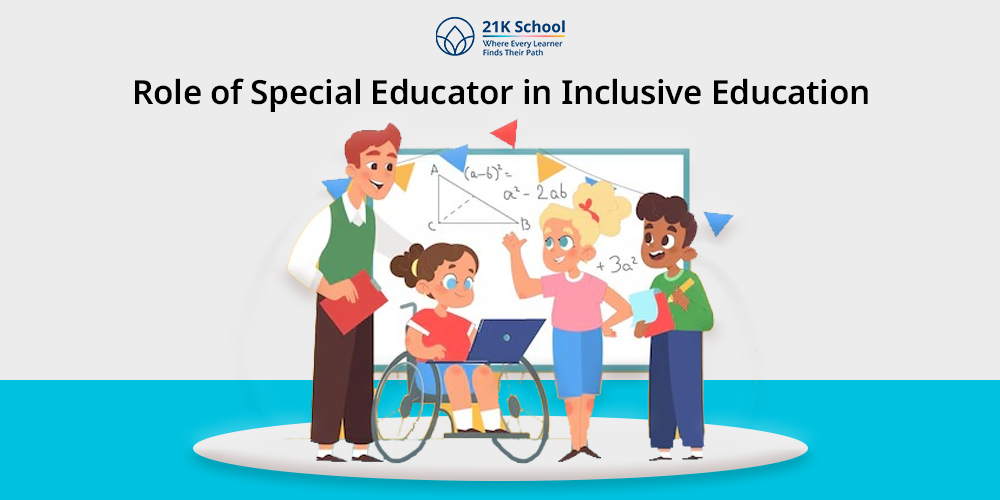
Consider a classroom in which all students regardless of their limitations are included in the learning process. The students with disabilities are not separated into an isolated group; they are fully involved and cooperate with the rest.
This is what inclusive education is all about and special educators have a key role to play in bringing this to reality. They are not only giving tuition to the students with disabilities.
They are working together with the other teachers, changing the curriculum and giving every kid whatever they need to succeed. Their work is not only about academic development.
It is also about the social, emotional, and personal lives of students with disabilities in society with their counterparts.
This paper will examine the significant work of special educators in integrated classrooms. And use the same to create conditions where every student is able to learn, mature and excel with others despite their unique needs.
Contents
- Who is a Special Educator in Inclusive Education?
- 8 Central Roles of Special Educators in Inclusion Education
- 1. Curriculum Redesigning
- 2. Assessment and Identification
- 3. Development of Individualized Education Plans (IEPs)
- 4. Enhancing Emotional Well-being and Social Inclusion
- 5. Collaboration with Teachers and Training
- 6. Family and Community Intervention
- 7. Application of Assistive Technology
- 8. Tracks and Reports
- Why to Choose Inclusive Education?
- Wrap It Up
Who is a Special Educator in Inclusive Education?
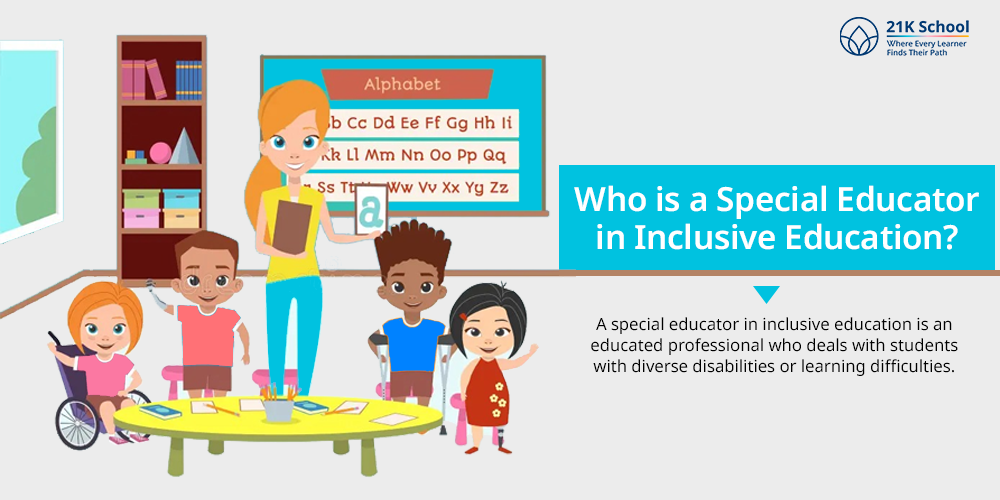
A special educator in inclusive education is an educated professional who deals with students with diverse disabilities or learning difficulties. These disabilities might include autism, learning disability, speech and language disorder, and physical disability.
Such teachers are also knowledgeable and skilled. Which means they are able to teach students with special needs using appropriate methods, materials and assessment activities.
Special educators in inclusive settings work together with general educators to adjust the curricula and teaching. This facilitates the special needs students so that they can fit in the general education instructional classroom.
This would aim at offering an environment which supports the diverse abilities of every student and makes everyone learn. Special teachers play an imperative role in developing strategies that facilitate learning of all students.
Learners develop as a unit that facilitates social interaction, academic performance, and mental wellbeing.
8 Central Roles of Special Educators in Inclusion Education
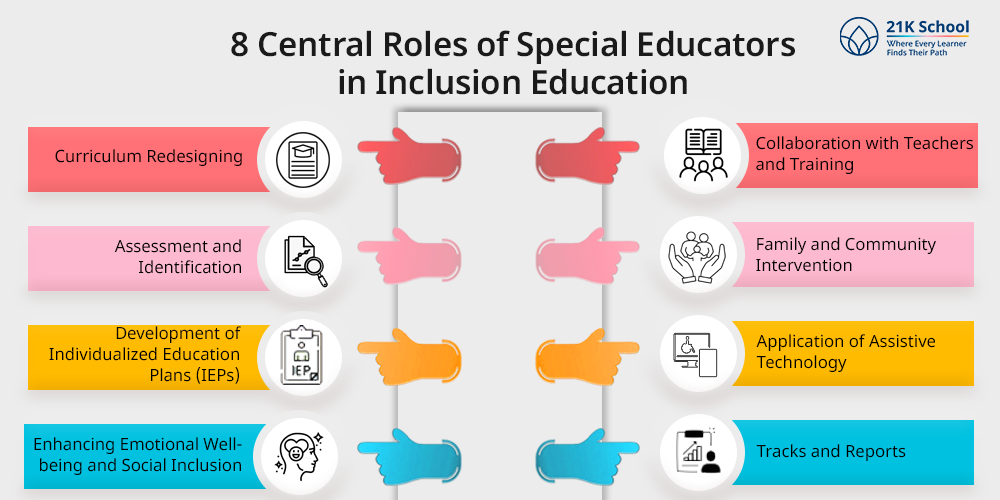
The roles played by special educators in inclusive classrooms are diverse and are beyond teaching traditional subjects. Their work loads are enormous and they need to have a sound knowledge on the various learning needs.
They also have to work well with other teachers, parents and societies. Some of the highly impacted areas by special educators in the inclusive education environment are outlined below:
1. Curriculum Redesigning
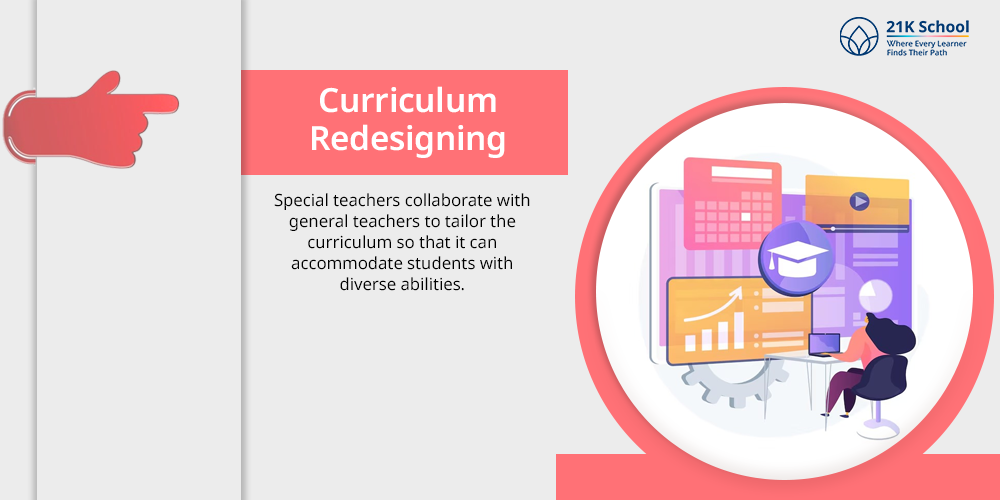
Among the key functions of a special educator in an inclusive system is the role of redesigning and adapting curriculum. The one-size-fits-all education in an inclusive classroom does not work.
Special teachers collaborate with general teachers to tailor the curriculum so that it can accommodate students with diverse abilities. It can include lesson simplifications, the availability of other forms to deliver information (e.g., visual aids, audio resources).
Or opt for alternative activities that go to the needs of students with disabilities. Special educators can accommodate all the students through the curriculum making the same content accessible to all.
Thus, allowing all students to contribute meaningfully to the lessons.
2. Assessment and Identification
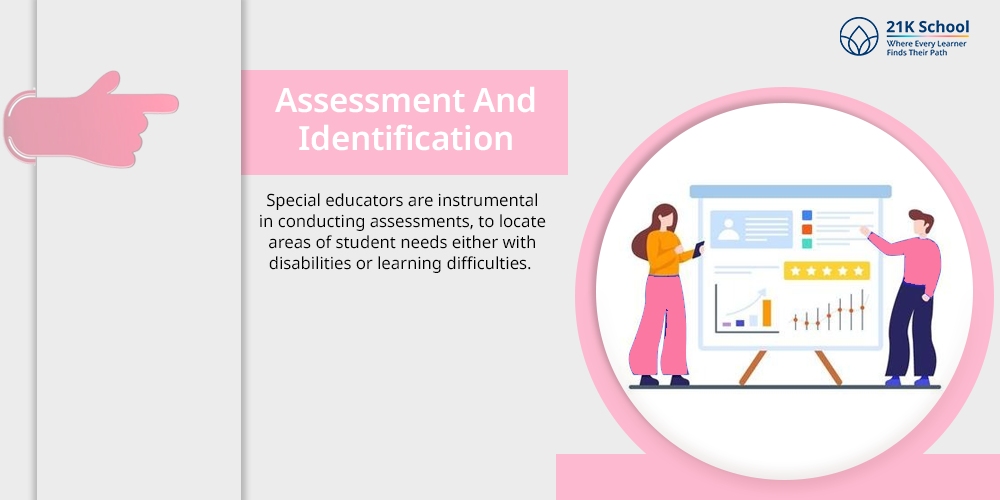
Special educators are instrumental in conducting assessments, to locate areas of student needs either with disabilities or learning difficulties. Timely identification of the need to provide extra support to the student is central to providing quality intervention.
Special teachers apply many types of formal and informal assessment. These are to figure out the abilities and limitations of learners, academically as well as socially.
With keen evaluation, special educators can identify where students require additional assistance be it reading, math, speech or behavior skills. Data collected in assessments are applied in personalizing the instruction and interventions.
Hence each student gets the support they need to excel by using formative assessment tools .
3. Development of Individualized Education Plans (IEPs)
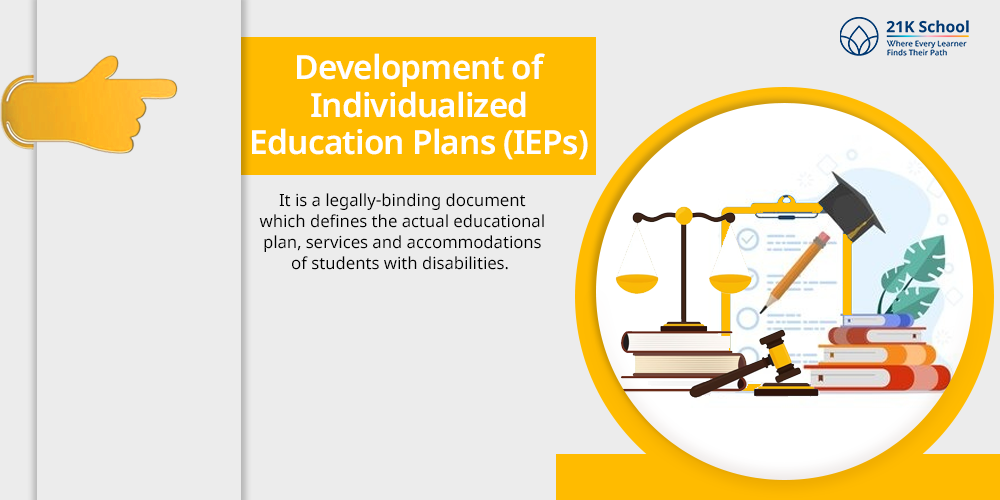
Individualized Education Plan (IEP) is also one of the principles of inclusive education. It is a legally-binding document which defines the actual educational plan, services and accommodations of students with disabilities.
Special educators prepare and carry out IEPs in coordination with the student parents, general educators and other professionals. The IEP offers an individualized plan to every learner so that his or her specific needs are addressed in the classroom.
Special educators play a crucial role in formulating these plans, checking on their progress and revising them to enhance their progress. The IEP is a very essential instrument, which aids the disabled students to gain access to the general curriculum.
And that too in a manner that fits their affinities and impediments.
4. Enhancing Emotional Well-being and Social Inclusion
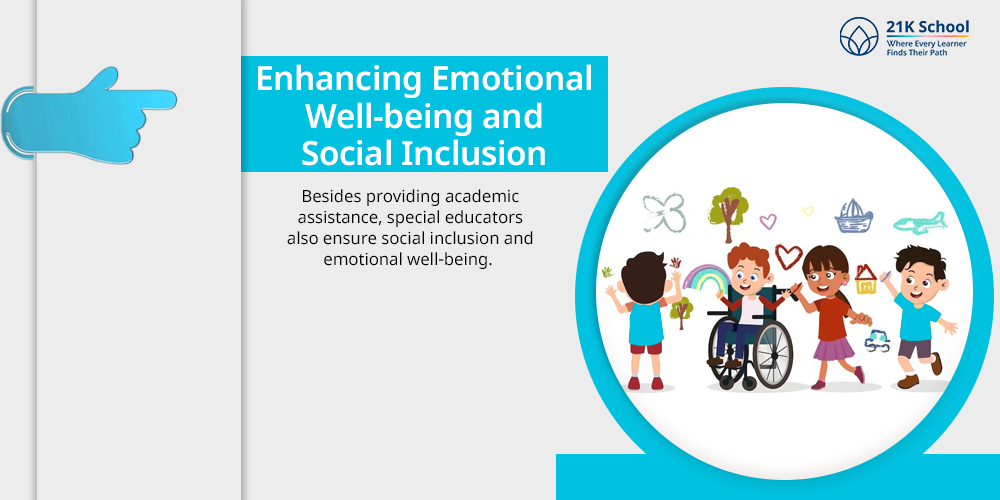
Besides providing academic assistance, special educators also ensure social inclusion and emotional well-being. Learners with disabilities are quite likely to experience difficulties with socialization and become socially isolated.
Special educators strive to make a supportive and inclusive classroom that embraces all students. They adopt measures to foster healthy peer relations, minimize bullying and help students learn how to connect socially.
Specific educators usually head social skills training sessions, group activities, and provide students with tips on conflict resolution. In making the students with disabilities feel like they belong, they are assured not only in academic activities but also in social and extracurricular activities .
5. Collaboration with Teachers and Training
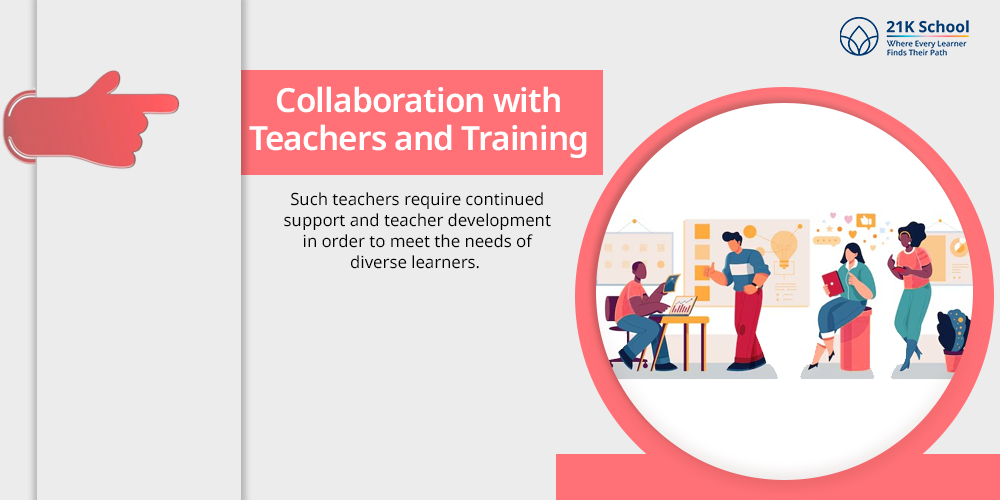
Inclusive education is one of the main features concerning a special educator collaborating with teachers in general education. Such teachers require continued support and teacher development in order to meet the needs of diverse learners.
Special educators can train on identifying differentiated learning instruction, behavior management, and accommodations and modifications. They integrate themselves with other teachers who will help them develop a cohesive instructional system.
They also help in adapting instructional works and assessments to accommodate disabilities among the students. This collaboration will make sure that students are under constant care during school hours.
6. Family and Community Intervention
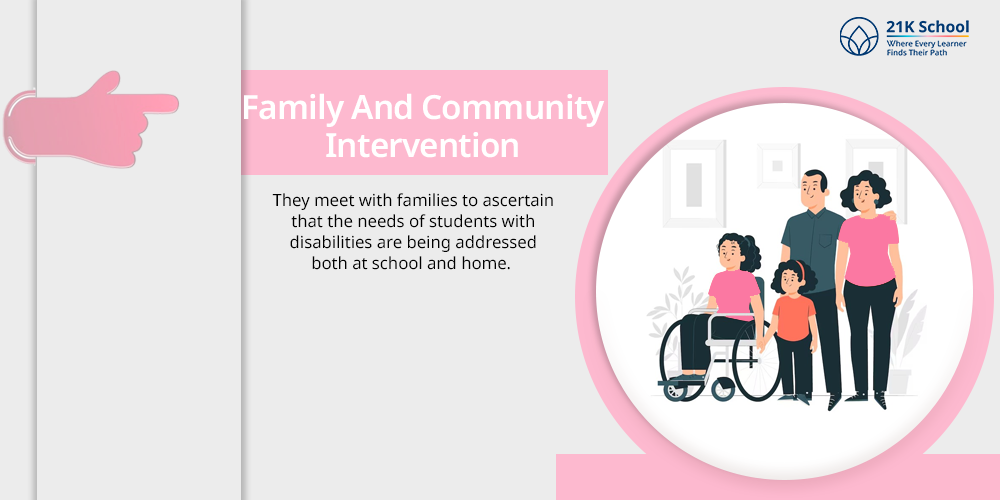
Special teachers understand the value of the family in the educational process. They meet with families to ascertain that the needs of students with disabilities are being addressed both at school and home.
Special educators also assist families to help their child learn and develop when there is no teacher in the classroom. Moreover, special educators usually incorporate the community to educate people on disabilities and build a more inclusive environment.
They can join some workshops, develop informational resources, or refer families to a local support group.
7. Application of Assistive Technology
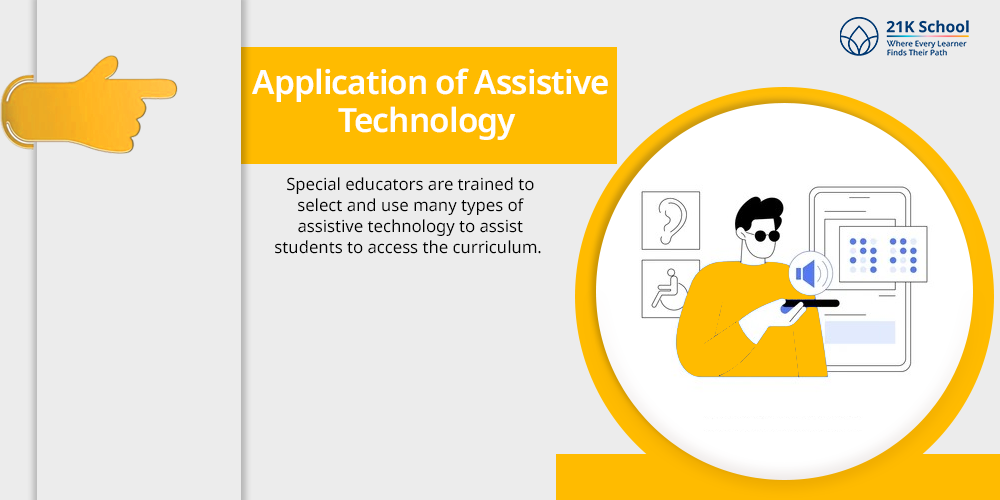
Assistive technology is crucial in the current classrooms in assisting students with disabilities. Special educators are trained to select and use many types of assistive technology to assist students to access the curriculum.
That may be communication equipment, screen readers, or specialized keyboards, which may help students with learning, physical, or communication problems.
When implementing assistive technology to classrooms, special educators equip their students with the means to take part in their learning. In addition they learn to express what they know in a format adapted to their capabilities.
8. Tracks and Reports
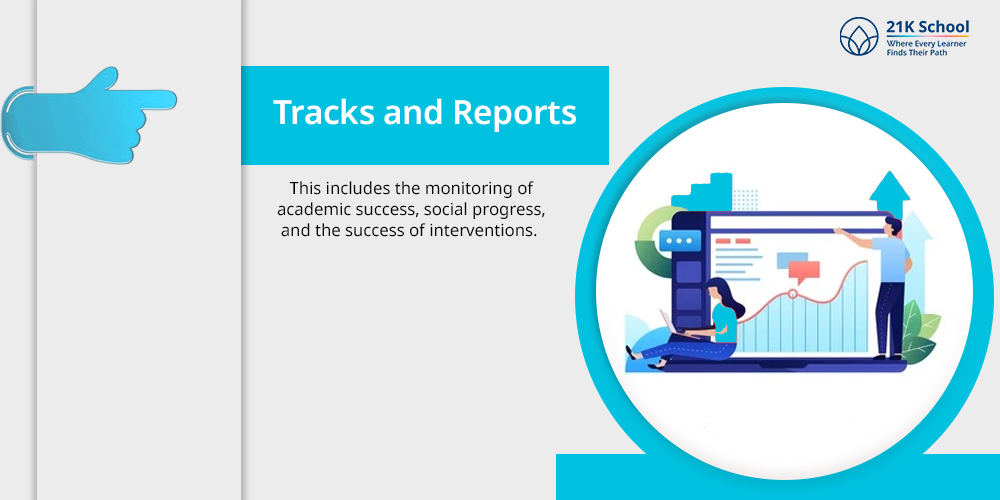
The task of special educators is to monitor the development of the disabled on a regular basis. This includes the monitoring of academic success, social progress, and the success of interventions.
Special educators gather data, evaluate IEP objectives, and change methodology when needed to guarantee the students make significant gains.
Special educators must pay close attention to student improvement to see whether the help they provide to students is effective. This further assists in developing the skills they need to succeed at school and socially.
Why to Choose Inclusive Education?
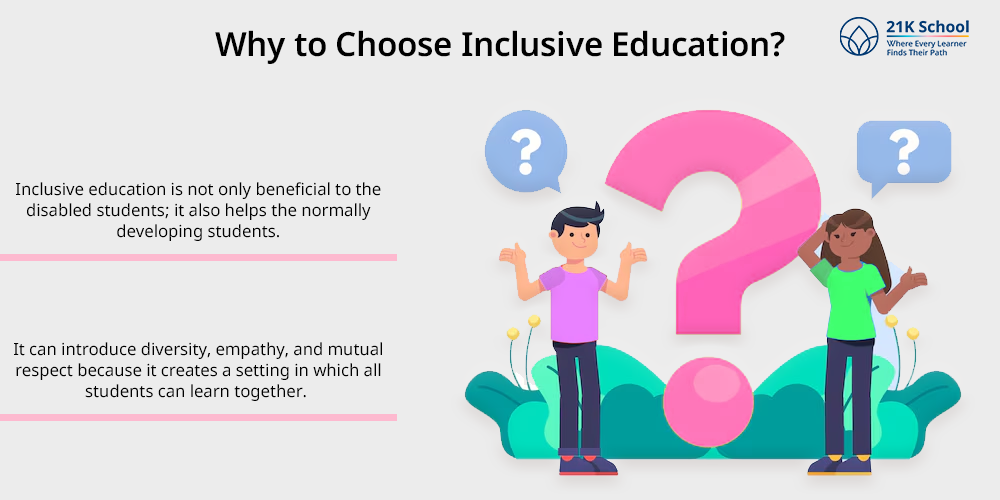
Inclusive education is not only beneficial to the disabled students; it also helps the normally developing students. It can introduce diversity, empathy, and mutual respect because it creates a setting in which all students can learn together.
It also assists students with disabilities to acquire significant social and academic skills that qualify them for future opportunities in the society. Inclusive education promotes awareness of diversity and readiness of students without disabilities to live in a diverse world.
Inclusive education works collaboratively, making students learn to appreciate differences and learn to strive towards a common goal.
Wrap It Up
The part of a special educator in inclusive learning is crucial and groundbreaking. With a lot of hard work, these professionals make an environment where students with disabilities are not only welcomed but appreciated.
Special educators collaborate with general educators, families, and the community on a regular basis. This is to make sure that every student who needs support in academic, social and emotional needs gets it.
Skillful special educators foster inclusive education that results in a more inclusive and fair society. A community where all students, irrespective of their strengths, have a chance to realize their potential. It criticizes conventional education systems and gives a more integrated, student-centred learning strategy, which is beneficial to all.
